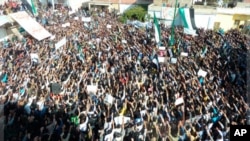The United States is blaming sustained government brutality for the apparent emergence of an organized, armed opposition in Syria.
State Department officials say they do not condone violence by either side in the confrontation, but that armed attacks by the opposition only play into the hands of Syrian President Bashar al-Assad.
State Department Deputy Spokesman Mark Toner called incidents like Wednesday's reported attack on the intelligence base north of the Syrian capital understandable, given the unrelenting crackdown by the government.
"It’s not surprising that we are now seeing this kind of violence. We don’t condone it in any way, shape or form, but let’s be very clear that it is the brutal tactics of Assad and his regime in dealing with what began as a non-violent movement that is now taking Syria down a very dangerous path," he said. "We have spoken all along about our concerns that the brutal crackdown by the Syrian government would engender this kind of reaction."
Toner said the U.S. has few details of the attack. It has been attributed to the self-proclaimed “Free Syrian Army,” which is said to be made up of defectors from government security forces.
Although the U.S. has contacts with an array of Syrian opposition figures, he said he was unaware of any dealings with the armed group.
Syrian authorities have blamed the country’s long-running political unrest on foreign-backed militants and Toner said opposition violence like Wednesday’s reported incident "really plays into Assad’s hands."
Toner said the Obama administration still intends to send U.S. ambassador to Syria Robert Ford back to his post next week, despite a spate of attacks on foreign missions in Damascus -- especially those of member countries of the Arab League.
The Arab League this week suspended Syria for its failure to implement the regional organization’s peace plan.
Robin Wright, a veteran diplomatic reporter and senior fellow at the U.S. Institute of Peace, says the Arab League’s action against Syria may be "the beginning of a turning point" for the traditionally cautious regional body.
"The Arab leaders have begun to understand that they are also being held to account, and that the streets are watching what they do," she said. " And they will be judged, at home, in terms of their own credibility and legitimacy, on what they do about Syria, particularly after the United Nations concluded that 3,500 [Syrians] have been killed and some 70,000 have been imprisoned."
U.S. ambassador Ford was recalled to Washington for consultations last month amid concern for his safety after he drew the ire of Syrian officials for meeting with opposition figures.
French envoy to Damascus Eric Chevallier, who like Ford has had a high public profile in the unrest, was recalled to Paris Wednesday amid the wave of embassy attacks.
Toner, who blamed the latest incidents on pro-government "thugs" and "rent-a-mobs," said the U.S. embassy continues to function and there has been no change in plans for Ford’s return to post.
US: Syrian Brutality Spurs Opposition Violence

